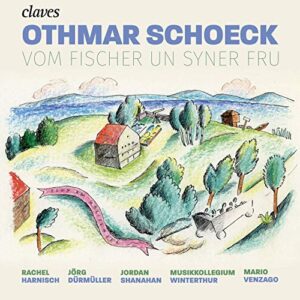Among neglected 20th-century composers, Othmar Schoeck (1886-1957) is one of the really great ones. Not only for his style of lyrical late romanticism—long-derided but en vogue again (i.e., his violin and cello concertos, his songs)—but also for his strand of romantic modernism where I rank his song-cycle Notturno ex aequo alongside Alban Berg’s Violin Concerto and Piano Sonata.
That’s enough reason to seek out his dramatic cantata, or small-scale opera, Vom Fischer un syner Fru (The Fisherman and His Wife) on the subject of the northern German folktale that gained wider appeal in the collections of the Brothers Grimm. At the same time let’s be honest: Lulu this ain’t; in this work Schoeck lacks the atonal and borderline tonal seduction that is Berg’s or Notturno’s trademark, nor has it the lush grandeur of a Zemlinsky opera. On the upside: it’s short, to the point, and quite enjoyable to listen to if you are into densely chromatic, reasonably modern tonal music with a simple edge and private mien.
At the center of the fairytale is the five times repeated rhythmic refrain that, once you’ve been read the story as a kid, you will never forget: “Manntje, Manntje, Timpe Te / Buttje, Buttje inne See / myne Fru de Ilsebill / will nich so, as ik wol will”—which I’d render in English as something like this: “Munntye Munntye, Tumpti-Tee / Flounder, Flounder in the Sea / Elisabeth, she wants, my wife / Not as I—but I no strife.” That serves as a convenient structure around which to arrange this cantata in variations, each becoming darker and stormier as the flounder in question keeps granting the reluctant wishes of the fisherman for his wife’s latest demands. Until she finally overplays her hand (she wants to become God, not content being pope) and ends up in the pisspot [sic] of a shack the couple started out with.
Written between 1928 and 1930, it is scored for three voices (wife, husband, fish), small orchestra, and piano. The latter accompanies the recitatives that give the work a slightly archaic touch. A beautiful simplicity displayed in the overture sets the tone; Jörg Dürmüller’s husband gets to display his honey-toned tenor in gentle lyrical passages. As the intensity increases, soprano Rachel Harnisch proves her dramatic abilities while Jordan Shanahan’s even-keeled bass never (my apologies) flounders. After barely 40 minutes we come full circle in the seventh scene, back to the lyrical stillness of the opening.
The whole performance under Mario Venzago, a splendid Schoeck champion (don’t judge him just on his quirky Bruckner, if you happen to have found those recordings on CPO enervating), is very fine. The history is very rich here, with the Musikkollegium Winterthur orchestra having been the band that played the second performance and Swiss premiere of Der Fischer…all on the instigation of Swiss industrialist Werner Reinhart who had commissioned and supported the creation of the cantata. Perhaps this is not everyone’s thing, but as they say: One man’s fish is another man’s poisson.
































